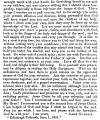|
Jean Ramsay, Mrs James Guthrie.
The trials and tribulations of Mrs James Guthrie demonstrate a special vindictiveness on the part of the Earl of Middleton, who bore a continuing grudge against her husband for his declaring Middleton excommunicated in 1650. On that occasion, when a messenger had arrived requesting him to delay the act, she had said to her husband “My Heart, what the lord gives you light and clearness to do, that do, without giving giving a positive answer to the messenger.”
At the Restoration the Rev. James Guthrie was swept up by the avenging government with Middleton the Kings Commissioner. He was soon awaiting his inevitable execution in the Edinburgh Tolbooth. From here he wrote a very pathetic letter (below) to his wife on that fated day, 1 June 1661, ere he was hung and his head struck off to be placed on the Netherbow Gate.
Mrs Guthrie and the children were left in a penurious state but were aided by Sir George Maxwell of Pollock, who instructed his chaplain George Lang to take what money was available, only some five or six hundred merks Scots, to tide her over. In 1665 the machinery of government was seeking to constrain criticism and the publication of Presbyterian works, including a book by the exiled John Brown of Wamphray entitled ” An Apologetical Relation of the particular sufferings of the Faithful Ministers and professors of the Church of Scotland since August 1660.” This was lengthy vindication of the Covenanters and maintained the righteousness of their principles. As such it was bound to stir up resentment by the government, and a certain Archbishop James Sharp who described it as ” a damned book” which had fired up resistance in the West of Scotland.
Mrs Guthrie naturally came into the possession of a copy which resulted in her, and daughter Sophie`s appearance before the Privy Council. The records of the Edinburgh Tolbooth show that she was arrested and held a close prisoner and allowed no visitors in mid December .

She appeared to answer the charges on 8 February 1666 where she was required to disclose what they knew of the book, its author and where they got it from. This they refused to do and were sentenced to banishment to the Shetlands (the Tolbooth records says Zetland ). Their banishment at this time was technically illegal as the publication in question had not, until that day, been proclaimed as seditious nor was possession a crime. But it meant little to the Privy Council. At the next meeting of the Privy Council on 2 March, a petition was presented seeking alteration of their place of banishment to the continent, almost certainly to enable a move to the Scottish congregation in Holland. In the event Mrs Guthrie was banished from Edinburgh for a number of years and again petitioned the Council in January 1669 to allow her to visit her son, William, in Edinburgh who was ill. She was allowed to stay for just one month, before again having to remove outside the city.
Mrs Guthrie and daughter Sophia seem to have dropped out of events from then, and the son William, survived but a few years, dying whilst a young man before he could be licensed as a minister.
James Guthrie`s last letter, to his wife.


[For large image click on thumbnail.]
|